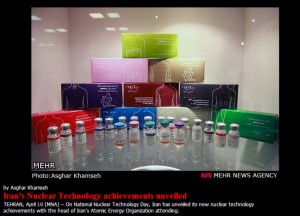Iran Willing to Change Arak Reactor to Produce Less Plutonium it Can’t Reprocess Anyway

Sample medical isotope packaging on display at this week’s National Nuclear Technology Day in Iran. Partial screen-grab from Mehr News.
While I was busy bashing David Petraeus yesterday over his tantrum warning us that dropping sanctions on Iran will result in more funding for terrorism, I missed an important Reuters article by Fredrik Dahl in which he noted this PressTV interview with Ali Akbar Salehi, the head of the Atomic Energy Organization of Iran. Salehi informs us that Iran is willing to make design changes to the Arak heavy water reactor that will result in it producing much less plutonium. The P5+1 group has been adamant that Iran not finish construction of Arak over fears that it would produce sufficient plutonium for a nuclear weapon, despite the fact that Iran has not built the sort of dedicated facility that would be required to recover the plutonium from spent fuel from the Arak reactor. Here is the relevant part of the PressTV article:
Iran has offered a scientific and logical proposal to clear up any ambiguities over the country’s Arak heavy-water reactor, a senior Iranian official says.
After the signing of the Geneva deal dubbed the Joint Plan of Action between Iran and six world powers, Tehran put forward a scientific plan to resolve the West’s alleged concerns over the Arak reactor, whose closure had been demanded by the Western states, said Head of the Atomic Energy Organization of Iran (AEOI) Ali Akbar Salehi on Wednesday.
In November 2013, Iran and the five permanent members of the United Nations Security Council – the US, France, Russia, China and Britain – plus Germany sealed an interim deal in Geneva to set the stage for the full resolution of the dispute over the Islamic Republic’s nuclear energy program.
“In our plan, we explained that we would redesign the heart of the Arak reactor, so that its production of plutonium will decrease drastically. They (Iran’s negotiating partners) were surprised when they saw our scientific and logical reaction,” Salehi said.
The Arak reactor, which uses natural uranium to produce radio medicines, is planned to gradually replace the Tehran Research Reactor, which produces medical radioisotopes for cancer patients.
Dahl gives us a bit more perspective on the importance of this announcement:
Iran has made a proposal that would significantly lower plutonium production at a planned reactor, a senior Iranian official was quoted as saying, signalling flexibility on a key issue in talks to end the nuclear dispute with world powers.
The comment by Ali Akbar Salehi, head of Iran’s atomic energy organisation, was the latest sign that a compromise may be possible over the Arak research reactor, which the West fears could yield weapons-usable material. Iran denies any such aim.
The fate of the heavy-water plant, which has not yet been completed, is one of the central issues in negotiations between Iran and six major powers aimed at reaching a long-term deal on Tehran’s nuclear programme by an agreed July 20 deadline.
Significantly, the Russian negotiator says that agreement over changes to Arak may be near:
Russia’s chief negotiator suggested after the April 8-9 talks that progress had been achieved on Arak. “The possibility of a compromise on this issue has grown,” Interfax news agency quoted Deputy Foreign Minister Sergei Ryabkov as saying.
Dahl ties the proposed changes at Arak to a plan put forward last week from Princeton University. From Princeton’s press release: Read more →
